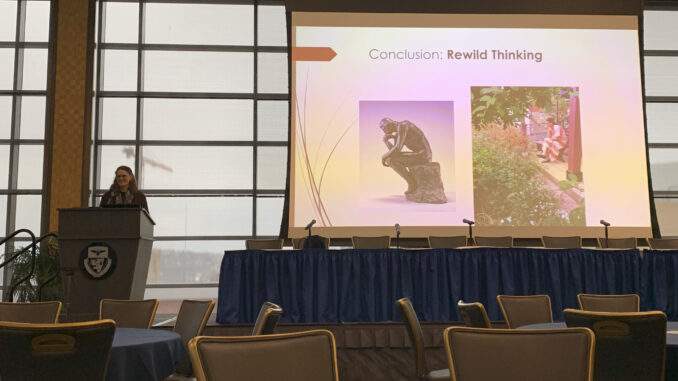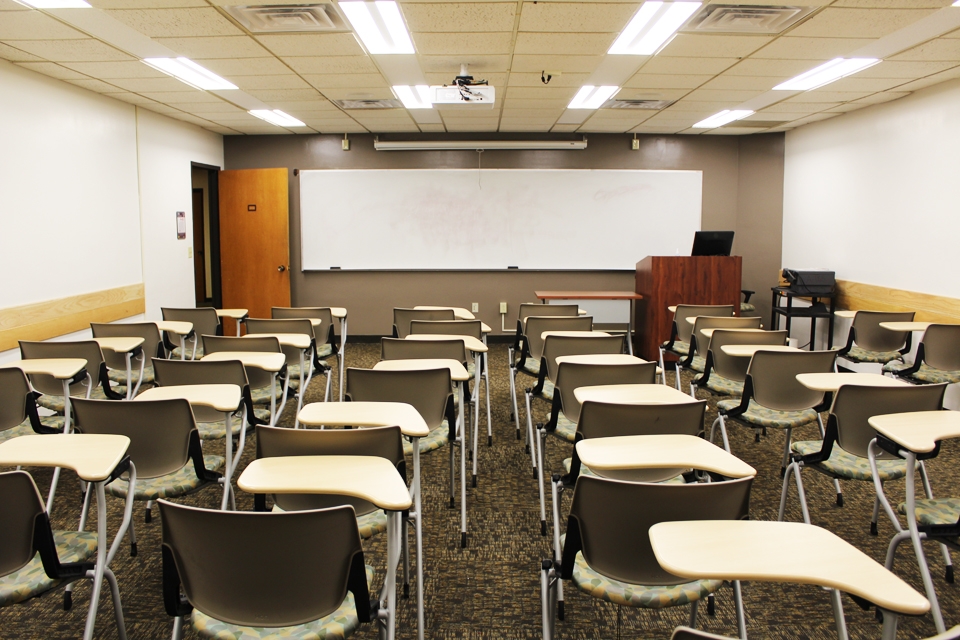
by Mary Liz Flavin | news editor
April 7, 2022
On Monday and Tuesday, Duquesne held an Integrity of Creation conference in the Power Center Ballroom that covered the topic: climate resiliency: collaboration, adaptation and action.
Over the course of two days various presentations, receptions and workshops educated students and faculty about pivotal issues revolving around climate change, research and public awareness.
One of the presentations, Rewilding: A Hegelian Reflection, tackled the philosophical idea of rewilding – a process in which nature reverts back to a wilder form. Jennifer Ann Bates, professor of philosophy at Duquesne University, led the discussion by viewing rewilding through the lens of philosopher G.W.F. Hegel.
“There are lots of bio-diverse gardners and we are all members of an involved, complex – dialectically evolving phenomenological garden,” Bates said. “I am going to argue an unorthodox reading of Hegel that the culmination of phenomenology presents experience as a dialectic becoming that develops through receptivity to preservation via biodiversity.”
Out of the gate, Bates compared the audience to gardners each in their own metaphorical garden. By comparing the garden to Hegel’s idea of the preservation of biodiversity, she began to introduce the concept of rewilding. In addition, one of the key concepts that was portrayed throughout the discussion was the idea that we as humans are observers in this process.
According to Hegel, the self-knowing spirit knows not only itself but also the negative of itself and its limit. To know one’s limit is to know how to sacrifice oneself. The sacrifice is the externalization in which spirit displays the process of becoming spirit in the form of free contingent happening, intuiting its pure self as time outside of it and equally its being as space.
The spirit he is referring to is the spirit of nature, including both humans and the rest of the natural world. What Hegel is saying here is that in order to better understand the natural world, [we] must externalize our experience with it.
Bates’ interpretation was that there is a limit to our experience and a portion of that interpretation that is foreign to us. There is a duality in which we realize there is a limit and that we are simultaneously reflecting on this experience.
Through the duration of Bates’ presentation, she compared Hegel’s findings to a variety of other philosophers as well as various scientists in the environmental community. In addition she applied her own philosophical conclusions and interpretations to allow the audience a better understanding of the topic.
Circling back to the idea that we as a society are a part of a phenomenological garden, Bates brought in the idea that on a much larger scale we are not only gardeners but are both receptive to and perceived by other gardeners. Hegel’s dialectic requires the process of taking abstract ideas and making them concrete through reflection, according to Bates.
“I sat in my garden until I could see the multiverse of the buzzing and active goings-on. At least in this one spot nature was coming back to life. Flowers, birds, millions of bugs and yes, pesky deer, would make their way through my tiny yard leaving ticks and eating some of my favorite flowers,” Bates said. “Again, I did nothing. It was an experience of sacrifice and the ongoing challenge of the preserving idea.”
In order to apply her philosophical findings on Hegel’s applied principles of rewilding, Bates allowed her backyard to become overgrown. In this process she found that many new plants and a variety of creatures began to thrive that weren’t there prior to the overgrown state. In addition, by allowing her garden to be overgrown, it was a sacrifice on her end because instead of containing the forces of nature in her backyard she had to permit it to grow in whichever way it chose.
“My hegelian reflection is part of not knowing and not doing which for a philosopher and a gardener is a sacrifice. If there is a wild it was already something we thought and something with which we were entangled,” Bates said.
This exact principle was at the heart of Bates’ discussion, that on a much larger scale, we should act as observers and allow nature to resort back to a ‘wilder’ form in order to help the planet reach a healthier state. Bates proposed that to experience this phenomenological process, Duquesne should fence off a portion of the campus and allow it to become overgrown and compare that section to the rest of campus. An additional idea was that the School of Osteopathic Medicine should incorporate liberal arts elements in order to promote different kinds of environmentalism.
Bates concluded by asking the audience to reflect as she had on the natural world around them as if they, themselves could view the world as gardens and gardeners.




